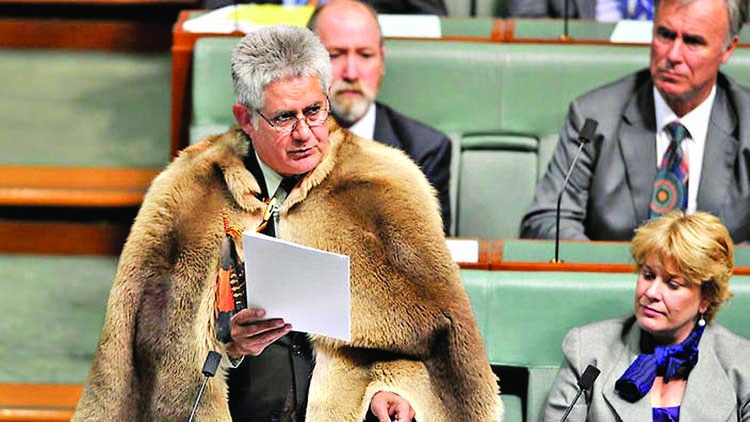Australia's first Aboriginal cabinet minister

Ken Wyatt was chosen this week to be Australia's minister for indigenous Australians, the first Aboriginal person ever to hold the role. It's a historic appointment which also makes him the first indigenous Australian to sit in cabinet.
Prime Minister Scott Morrison made the announcements as part of his revamped ministry, following a surprise election victory on 18 May.
Many indigenous Australians are celebrating the elevation of Wyatt, a 66-year-old conservative MP. But deep challenges lie ahead for the newly appointed minister, as Australia grapples with major debates over indigenous recognition and inequality. In 2010 Wyatt became the first Aboriginal man to be elected to the House of Representatives, winning the Western Australian seat of Hasluck.
In his maiden speech, he wore something rarely seen in the parliament. It was a kangaroo skin coat, adorned with feathers of a red-tailed black cockatoo, known as a booka - a symbol of Aboriginal leadership, presented by elders. He later became minister for aged care and indigenous health - an outer ministry position, meaning he did not sit in cabinet. Before entering politics, the Noongar man worked as a primary school teacher and as a senior public health official.
His mother, Mona Abdullah, was one of the "Stolen Generations" - Aboriginal children who were forcibly removed from their parents under infamous government policies aimed at assimilation. In parliament, Wyatt has won respect for sticking to his beliefs - even occasionally threatening to vote against his own party on specific issues. He has also sometimes drawn criticism, such as for resisting calls while aged care minister to mandate staffing levels in aged care facilities.
Aged care settings are currently the subject of a national inquiry. Incredibly honored to be the first Aboriginal Minister for Indigenous Australians, committed to working & walking together with our Elders, families & communities to ensure the greatness of our many nations is reflected in the greatness of our Australian nation., now and forever.
Australia has only ever had 10 indigenous lawmakers in federal parliament, with the majority joining only in the past decade. Indigenous people make up about 3% of Australia's population, but experts say their lack of parliamentary representation is not just because they're a minority.
It's rooted in Australia's colonial history and the systemic disenfranchisement of generations of indigenous people through government policy, says Associate Prof Dominic O'Sullivan from Charles Sturt University. It wasn't until 1962 that indigenous people gained the right to vote in federal elections.
"Indigenous people have been quite deliberately kept on the margins of politics for so long," says Associate Prof O'Sullivan, an expert on indigenous representation across Commonwealth parliaments. Wyatt's appointment to cabinet is historically significant and should be celebrated, he says. "But it also shows the depth of indigenous exclusion that it's taken this long since Federation [in 1901] and that we are celebrating this moment as something novel or unusual," he says.
The response from indigenous Australians has been overwhelmingly positive. Many have cited Wyatt's work in health, aged care and education as evidence of his capability to improve indigenous people's lives.
Indigenous Australians experience disproportionate levels of inequality on many measures, including life expectancy and rates of employment, schooling and incarceration. "Ken has the lived experience of some of the issues we're trying to address so he comes with much more credibility than the ministers before him," says Rod Little from the National Congress of Australia's First Peoples.
Others believe he can also be a champion in the struggle for constitutional recognition - another form of political representation that has frustrated indigenous people. Australia also remains the only Commonwealth country never to make a treaty with its indigenous peoples - a subject of frequent debate.
In 2017, then Prime Minister Malcolm Turnbull rejected a landmark proposal to set up an indigenous representative body in parliament - known as a "Voice to Parliament" - by arguing it would not be practical.The government still remains opposed to the idea, but Morrison says he is committed to achieving constitutional reform. In recent days he has announced that a new "national indigenous Australians agency" is to be established.
Karen Mundine, CEO of Reconciliation Australia, has labelled Wyatt's appointment a "confidence booster". "It's important that the Voice to Parliament is progressed in this term of parliament and that the prime minister works with First Peoples to lead that process to a referendum," Mundine said.
